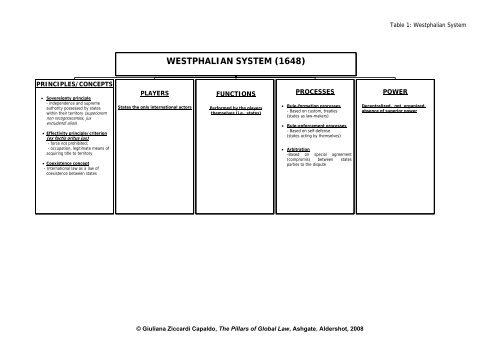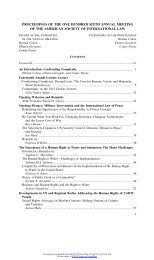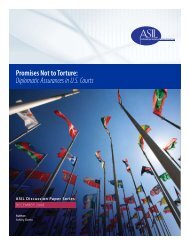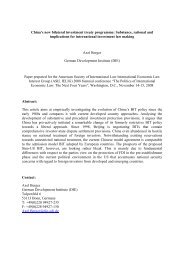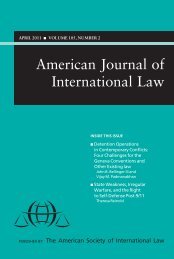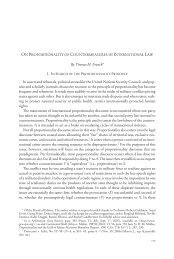westphalian system (1648) - American Society of International Law
westphalian system (1648) - American Society of International Law
westphalian system (1648) - American Society of International Law
Create successful ePaper yourself
Turn your PDF publications into a flip-book with our unique Google optimized e-Paper software.
PRINCIPLES/CONCEPTS<br />
• Sovereignty principle<br />
- independence and supreme<br />
authority possessed by states<br />
within their territory (superiorem<br />
non recognoscentes, jus<br />
excludendi alios)<br />
• Effectivity principle/criterion<br />
(ex factis oritus jus)<br />
- force not prohibited;<br />
- occupation, legitimate means <strong>of</strong><br />
acquiring title to territory<br />
• Coexistence concept<br />
- <strong>International</strong> law as a law <strong>of</strong><br />
coexistence between states<br />
PLAYERS<br />
States the only international actors<br />
WESTPHALIAN SYSTEM (<strong>1648</strong>)<br />
FUNCTIONS<br />
Performed by the players<br />
themselves (i.e., states)<br />
PROCESSES<br />
• Rule-formation processes<br />
- Based on custom, treaties<br />
(states as law-makers)<br />
• Rule-enforcement processes<br />
- Based on self-defense<br />
(states acting by themselves)<br />
• Arbitration<br />
-Based on special agreement<br />
(compromis) between states<br />
parties to the dispute<br />
© Giuliana Ziccardi Capaldo, The Pillars <strong>of</strong> Global <strong>Law</strong>, Ashgate, Aldershot, 2008<br />
Table 1: Westphalian System<br />
POWER<br />
Decentralized, not organized,<br />
absence <strong>of</strong> superior power
PRINCIPLES/<br />
CONCEPTS*<br />
• Principle <strong>of</strong> sovereign equality<br />
(Art. 2 (1))<br />
● Fundamental values and<br />
legality principles (Art. 1 (1),<br />
(2))<br />
- peace and security;<br />
- self-determination;<br />
- human rights<br />
• Force, occupation prohibited<br />
(Art. 2 (4))<br />
• Legality vs. effectivity (ex<br />
iniuria jus non oritur)<br />
• Authority<br />
- prescriptive/ binding powers<br />
(Arts. 17 (2), 25);<br />
- majority principle (Arts. 18 (2),<br />
27 (2) (3), 67 (2), 89 (2), Charter<br />
and Art. 55, ICJ Statute)<br />
• Cooperation concept (Art. 1<br />
(3))<br />
*States’ sovereignty limited by<br />
legality principles and Authority<br />
UN CHARTER SYSTEM (San Francisco 1945)<br />
PLAYERS<br />
• States<br />
- <strong>system</strong> limited to inter-state<br />
relationships;<br />
- exclusion <strong>of</strong> new powers/actors<br />
FUNCTIONS/<br />
PROCESSES<br />
• Rule-making<br />
- codification (Art. 13 (1)(a));<br />
- GA Declarations <strong>of</strong> Principles (not<br />
binding);<br />
- ICJ quasi-legislative function:<br />
advisory opinions (Art. 96);<br />
- SC binding decisions (Art. 25)<br />
• Enforcement System<br />
- suspension, expulsion (Arts. 5,<br />
6);<br />
- Collective Security System (Chap.<br />
VII)<br />
• Ascertainment and Judicial<br />
functions<br />
- SC Political ascertainment (Art.<br />
39);<br />
- ICJ judicial functions (Arts. 92,<br />
94)<br />
• Administrative lawgivers:<br />
- Secretariat (Chapter XV);<br />
- ECOSOC (Chapter X);<br />
- Trusteeship Council (Chapter<br />
XIII);<br />
- UNAT<br />
POWERS*<br />
• Characters and limits:<br />
- organized decision-making<br />
power;<br />
- legislative weakness;<br />
- preeminence <strong>of</strong> executive;<br />
- imbalance <strong>of</strong> powers;<br />
- veto power (Art. 27 (3)) blocking<br />
SC decisions Chapter VII;<br />
- weakness <strong>of</strong> judicial control<br />
*Collective Security System not<br />
able to guarantee respect for<br />
global values<br />
© Giuliana Ziccardi Capaldo, The Pillars <strong>of</strong> Global <strong>Law</strong>, Ashgate, Aldershot, 2008<br />
Table 2: UN Charter System<br />
UN SUPREMACY<br />
• Preeminence <strong>of</strong> the Charter’s<br />
obligations (Art. 103)<br />
• Regional arrangements or<br />
agencies (Chap. VIII)<br />
- activities consistent with the<br />
purposes and Principles <strong>of</strong> the UN<br />
(Art. 52 (1));<br />
- no enforcement action shall be<br />
taken without the authorization <strong>of</strong><br />
the SC (Art. 53 (1))<br />
• Specialized Agencies<br />
- agreements to co-ordinate the<br />
activities with the UN (Arts. 57,<br />
63);<br />
- the GA approves financial and<br />
budgetary arrangements and<br />
examines the administrative<br />
budgets (Art. 17 (3))
THE PILLARS<br />
• Verticality<br />
- regulatory: universally defined<br />
principles;<br />
- functional: integrated decisional<br />
processes with institutions’<br />
participation<br />
• Legality<br />
- legality principle (ex iniuria jus<br />
non oritur);<br />
- control <strong>of</strong> legality over global<br />
governance<br />
• Integration<br />
- organizational model <strong>of</strong> the<br />
world’s society based on the<br />
gradual integration between<br />
various <strong>system</strong>s <strong>of</strong> organization<br />
(legal, social, economic, religious,<br />
and mediatic) at different<br />
aggregation levels (local to<br />
worldwide)<br />
• Collective guarantees<br />
- integrated mechanisms <strong>of</strong><br />
monitoring, ascertainment, and<br />
coercive implementation measures<br />
GLOBAL LEGAL SYSTEM<br />
LEGAL SYSTEM FOR A UNIVERSAL HUMAN SOCIETY<br />
PRINCIPLES/<br />
CONCEPTS*<br />
• Global constitutional<br />
principles/values<br />
- prohibition on the use <strong>of</strong> force;<br />
safeguarding self-determination,<br />
human rights; common heritage<br />
concept; sustainable development<br />
• Multilateral Regimes<br />
- to formulate regulations, to<br />
manage, protect, and conserve<br />
environment, global commons,<br />
natural resources, cultural goods<br />
• Global Economy<br />
- WTO/GATT rules, world financial<br />
regulations<br />
• Integration concept<br />
- harmonization/ integration <strong>of</strong><br />
legal <strong>system</strong>s in the direction <strong>of</strong><br />
global law<br />
- global law is the third stage <strong>of</strong><br />
development <strong>of</strong> international law,<br />
the preceding two phases being<br />
the international law <strong>of</strong><br />
coexistence and the international<br />
law <strong>of</strong> cooperation<br />
*The emergence <strong>of</strong> rules oriented<br />
towards individuals, ethnic groups,<br />
humankind, marks the transition from<br />
inter–state society to global<br />
community<br />
• States<br />
PLAYERS<br />
• Non-state actors/global forces<br />
(IGOs, NGOs and different forms<br />
<strong>of</strong> power, ie. new powers)<br />
GLOBAL FUNCTIONS/<br />
PROCESSES*<br />
• Rule-formation<br />
- quasi–organic processes;<br />
- public participation, together<br />
with non–governmental<br />
organizations, and private sectors<br />
• Regime <strong>of</strong> compliance and<br />
enforcement<br />
- integrated <strong>system</strong>s for<br />
monitoring and action<br />
• Global judicial function<br />
- global courts and tribunals to<br />
protect global values and<br />
commons<br />
- participation <strong>of</strong> civil society in<br />
international courts and tribunals<br />
(e.g. Human Rights Courts,<br />
<strong>International</strong> Criminal Court)<br />
*Multilateral normative processes and<br />
actions for managing worldwide economic<br />
and social development as well as threats<br />
to international peace and security<br />
© Giuliana Ziccardi Capaldo, The Pillars <strong>of</strong> Global <strong>Law</strong>, Ashgate, Aldershot, 2008<br />
Table 3: Global Legal System<br />
GLOBAL GOVERNANCE*<br />
• Co-management <strong>of</strong> global<br />
values and commons<br />
• Integrated decision-making<br />
processes (institutional<br />
participation and control)<br />
• Multilateral actions and<br />
shared responsibility<br />
• Central role <strong>of</strong> UN<br />
• Judicial control over the<br />
executive<br />
*Shared governance under UN control<br />
involving the forces <strong>of</strong> the global<br />
community (UN organs, states, non-state<br />
actors, IGO, NGOs, civil society, and the<br />
private sector)
RULE-FORMATION PROCESSES IN GLOBAL LAW<br />
SYSTEMS AND TREATY REGIMES GENERAL RULES AND PROCESSES<br />
• NORMATIVE REGIMES FOUNDED IN<br />
INTERNATIONAL INSTITUTIONS<br />
● UN Charter System<br />
● The Bretton Woods System/WTO<br />
● Regional treaty regimes<br />
• LEGAL REGIMES for co-management <strong>of</strong> the<br />
environment, cultural goods, natural resources, and<br />
global commons (the Oceans; Antarctica; Outer Space;<br />
the Atmosphere)<br />
• INFORMAL LAW-MAKING promulgated by<br />
international arbitral panels, networks <strong>of</strong> regulatory<br />
entities, or non-state accreditation and standard-setting<br />
bodies<br />
PROCESSES<br />
A) CUSTOM<br />
• Notion<br />
- general practice accepted as law (Art. 38 (1)(b), ICJ Statute)<br />
• Characters<br />
- general international rules, substantive and procedural (e.g., pacta sunt servanda and<br />
customary treaty law)<br />
• Requirements<br />
- diuturnitas, opinio juris sive necessitatis<br />
• Formation Process<br />
- uniform and constant behavior <strong>of</strong> “each” individual member <strong>of</strong> the international community;<br />
- accompanied by acceptance. The will <strong>of</strong> “each” member remains distinct<br />
• Decline <strong>of</strong> Custom<br />
B) GENERAL PRINCIPLES OF LAW<br />
• Notion<br />
- general principles <strong>of</strong> law recognized by civilized nations (Art. 38 (1)(c), ICJ Statute)<br />
• Characters<br />
- principles <strong>of</strong> legal logic (ne bis in idem, nemo judex in re sua, etc.) and principles <strong>of</strong> natural law<br />
(prohibition <strong>of</strong> genocide, slavery, other gross violations <strong>of</strong> human rights)<br />
• Formation Process<br />
- universal principles <strong>of</strong> law posed at the level <strong>of</strong> national legal orders;<br />
- accepted internationally/applied by international tribunals<br />
C) INTEGRATED PRINCIPLES OF LAW<br />
• Notion/Characters<br />
- principles <strong>of</strong> the shared management <strong>of</strong> global interests/values<br />
- immediate and direct expression <strong>of</strong> the will <strong>of</strong> the global community;<br />
- without the need for custom/each state’s acceptance (i.e., omisso medio)<br />
• Formation Process*<br />
- intersection <strong>of</strong> prevailing forces and the public interest:<br />
- “proposal” <strong>of</strong> dominant powers/global forces;<br />
- accepted as law in institutional fora (quasi-organic process).<br />
Proposal and consent represent the basic elements <strong>of</strong> a dynamic, democratic process for the<br />
adoption <strong>of</strong> general international norms<br />
*Security Council’s Open Debates;<br />
G8 as a forum for proposals, vested with power to initiate<br />
© Giuliana Ziccardi Capaldo, The Pillars <strong>of</strong> Global <strong>Law</strong>, Ashgate, Aldershot, 2008<br />
Table 4: Rule Formation Processes in Global <strong>Law</strong><br />
BASIC RULES/JUS COGENS<br />
● Notion and Characters<br />
- global constitutional<br />
principles, peremptory norms<br />
<strong>of</strong> general international law<br />
(jus cogens);<br />
- binding on all actors <strong>of</strong> the<br />
global community;<br />
- no derogation is permitted<br />
(Arts. 53, 64, Vienna<br />
Convention);<br />
- can be modified only by a<br />
subsequent norm <strong>of</strong> general<br />
international law having the<br />
same character (Art. 53,<br />
Vienna Convention)<br />
● Formation Processes<br />
- processes indexed in A), B),<br />
C), before. Not all general<br />
rules produced by these<br />
processes (customary norms,<br />
general principles <strong>of</strong> law;<br />
integrated principles <strong>of</strong> law)<br />
are peremptory norms<br />
These processes do not include<br />
s<strong>of</strong>t law (i.e. the General<br />
Assembly's declarations <strong>of</strong><br />
principles;the ICJ’s advisory<br />
opinions) that is not binding<br />
but can only produce another<br />
legal effect: the "effect <strong>of</strong><br />
lawfulness”
UN COLLECTIVE SECURITY SYSTEM<br />
(Chap. VII, Charter)<br />
CONCEPTS<br />
• Managed by Security Council<br />
• Centralized (Arts. 11 (2); 24-25; 39-50)<br />
• Veto rule (Art. 27 (3))<br />
REQUIREMENTS<br />
• Threats to the peace, breaches <strong>of</strong> the peace, and<br />
acts <strong>of</strong> aggression<br />
• Ascertainment by Security Council (Art. 39)<br />
MECHANISM AND MEASURES<br />
• Provisional measures (Art. 40)<br />
• Measures not involving the use <strong>of</strong> armed force:<br />
these may include complete or partial interruption <strong>of</strong><br />
economic relations and <strong>of</strong> rail, sea, air, postal, telegraphic,<br />
radio, and other means <strong>of</strong> communication, and the<br />
severance <strong>of</strong> diplomatic relations (Art. 41)<br />
• Measures involving the use <strong>of</strong> force: peace operations<br />
(Art. 42)<br />
GLOBAL LAW-ENFORCEMENT SYSTEM<br />
CONCEPTS<br />
• Enforcement measures co-managed:<br />
responsibility shared between states, UN,<br />
global/regional IOs; NGOs<br />
• Cooperative approach<br />
• States acting in the common interest (uti<br />
universi)<br />
• Central role <strong>of</strong> the UN/organs acting as<br />
community agents<br />
• Overcoming the veto rule<br />
REQUIREMENTS<br />
• Serious violations <strong>of</strong> peace, human rights,<br />
democracy, and other erga omnes<br />
obligations<br />
• Objective ascertainment <strong>of</strong> violations by<br />
UN organs<br />
• Institutional control over states acting in<br />
the common interest<br />
COLLECTIVE GUARANTEES/<br />
INTEGRATED SYSTEMS<br />
SYSTEMS AND MEASURES<br />
Table 5: Global <strong>Law</strong>-Enforcement System<br />
• Unilateral/multilateral military actions<br />
A) Authorized by the Security Council<br />
B) Non-authorized<br />
• Requirements<br />
- taken in lieu <strong>of</strong> ineffectiveness <strong>of</strong> institutions/SC blocked by veto;<br />
- necessity and urgency;<br />
- support <strong>of</strong> a large majority <strong>of</strong> states, regional IO, NGOs, and<br />
world’s public opinion;<br />
- UN legitimation: control <strong>of</strong> necessity, proportionality, respect <strong>of</strong><br />
jus cogens<br />
• Economic coercion/peaceful measures<br />
• Unilateral/multilateral economic, diplomatic, and others peaceful<br />
measures against responsible state;<br />
• Targeted sanctions pressuring individuals and entities (i.e., smart<br />
sanctions);<br />
• UN ascertainment <strong>of</strong> violations and control<br />
• Co-managed regimes/<strong>system</strong>s<br />
• Human rights implementation <strong>system</strong>s;<br />
• Integrated monitoring <strong>system</strong>s;<br />
• Integrated diplomatic <strong>system</strong>s to settle conflicts (e.g., the Road<br />
Map);<br />
• Mixed <strong>system</strong>s to enforce peace process in countries ravaged by<br />
civil war;<br />
• Integrated judicial <strong>system</strong>s to enforce crimes committed by<br />
individuals and to provide redress to victims: cooperation between<br />
state organs and international bodies (ad hoc, mixed criminal<br />
tribunals, ICC) according to the Statutes;<br />
• Integrated UN counter-terrorism <strong>system</strong><br />
• Regime compliance and enforcement in the global Commons;<br />
• Pollution control regimes<br />
© Giuliana Ziccardi Capaldo, The Pillars <strong>of</strong> Global <strong>Law</strong>, Ashgate, Aldershot, 2008
GLOBAL JUDICIAL SYSTEM<br />
WORLD’S JUDICIAL BODIES AND TRIBUNALS INTERNATIONAL COURT OF JUSTICE (ICJ)<br />
• <strong>International</strong> Tribunal <strong>of</strong> the <strong>Law</strong> <strong>of</strong> the Sea<br />
(ITLOS)<br />
• WTO Dispute Settlement Body (WTODSB)<br />
• <strong>International</strong> Criminal Bodies<br />
- <strong>International</strong> Criminal Court (ICC)<br />
- <strong>International</strong> Criminal Tribunal for the Former<br />
Yugoslavia (ICTY)<br />
- <strong>International</strong> Criminal Tribunal for Rwanda (ICTR)<br />
- Mixed/internationalized criminal jurisdictions (in Sierra<br />
Leone, Cambodia, East Timor, Lebanon)<br />
• Arbitration<br />
- Permanent Court <strong>of</strong> Arbitration (PCA)<br />
- <strong>International</strong> Centre for Settlement <strong>of</strong> Investment<br />
Disputes (ICSID)<br />
• international compliance bodies based on multilateral<br />
conventions (especially in the environmental field).<br />
ICJ AS PRINCIPAL JUDICIAL ORGAN OF THE UN (ART.<br />
92, CHARTER and ART. 1, ICJ STATUTE)<br />
• Contentious Jurisdiction<br />
• Competence:<br />
-only states may be parties (Art. 34 (1), Statute)<br />
• Jurisdiction:<br />
- all legal disputes (Art. 36 (1), Statute);<br />
- acceptance <strong>of</strong> the compulsory jurisdiction through<br />
declaration made under Article 36 (2), Statute<br />
• Applicable law:<br />
- the Court decides in accordance with international law (Art.<br />
38 (1) Statute);<br />
- power to decide ex aequo et bono (Art. 38 (2), Statute)<br />
• Decision/judgment:<br />
- binding character, between the parties only (Art. 94 (1),<br />
Charter; Art. 59, Statute);<br />
- final and without appeal (Art. 60, Statute);<br />
- remedies <strong>of</strong> enforcement (Art. 94 (2), Charter)<br />
• Advisory Function<br />
(Art. 96, Charter; Chapter IV, Statute)<br />
ICJ GLOBAL TRENDS*<br />
• The Court as the Guide directing the development <strong>of</strong><br />
human rights law, humanitarian law, selfdetermination<br />
- The Advisory function as quasi–legislative function<br />
• Court protection <strong>of</strong> human rights, peace, and other<br />
global values beyond the Charter veto and Statute:<br />
- The expansion <strong>of</strong> the power to indicate (Art. 41, Statute):<br />
the binding nature <strong>of</strong> provisional measures (LaGrand<br />
case);<br />
- The expansion <strong>of</strong> advisory function and the “definitive”<br />
ascertainment <strong>of</strong> violations <strong>of</strong> erga omnes obligations;<br />
-The validation <strong>of</strong> the procedure “Uniting for Peace” (GA<br />
Res. 377 (V) A)<br />
• Court’s Authority<br />
- authority over states’ organs;<br />
- judicial supremacy: the “intrinsic authority” <strong>of</strong><br />
the Court’s decisions;<br />
- authority in law-making processes<br />
• Court’s control over the UN organs<br />
- Relationship Court/ Security Council<br />
- functional parallelism;<br />
- complementarity Court/Council;<br />
- judicial control over the SC decisions;<br />
- overcoming <strong>of</strong> the veto rule<br />
*The Court as a Supreme Constitutional Court<br />
guardian <strong>of</strong> global constitutional values/providing<br />
legitimacy to world governance<br />
© Giuliana Ziccardi Capaldo, The Pillars <strong>of</strong> Global <strong>Law</strong>, Ashgate, Aldershot, 2008<br />
Table 6: Global Judicial System


